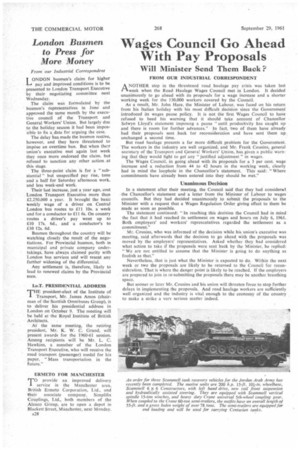Wages Council Go Ahead With Pay Proposals
Page 30

If you've noticed an error in this article please click here to report it so we can fix it.
Will Minister Send Them Back ?
FROM OUR INDUSTRIAL CORRESPONDENT
ANOTHER step in the threatened road haulage pay crisis was taken last week when the Road Haulage Wages Council met in London. It decided unanimously to go ahead with its proposals for •a wage increase and a shorter working week for the 130,000 workers covered by the Council.
As a result, Mr. John Hare, the Minister of Labour. was faced on his return from his Italian holiday with his most difficult decision since the Government introduced its wages pause policy. It is not the first Wages Council to have refused to heed his warning that it should take account of Chancellor Selwyn Lloyd's statement imposing a pause "until productivity has caught up and there is room for further advances." In fact, two of them have already had their proposals sent back tor reconsideration and have sent them up unchanged a second time.
But road haulage presents a far more difficult _problem for the Government, The workers in the industry are well organized, and Mr. Frank Cousins, general secretary of the Transport and General Workers' Union, has given a public warning that they would fight to get any "justified adjustment" in wages.
The Wages Council, in going ahead with its proposals for a 3 per cent. wage increase and a reduction from 44 to 42 hours in the working week, clearly had in mind the loophole in the Chancellor's statement. This said: "Where commitments have already been entered into they should be met."
Unanimous Decision
In a statement after their meeting, the Council said that they had considerAd the Chancellor's statement and a letter from the Minister of Labour to wages councils. But they had decided unanimously to submit the proposals to the Minister with a request that a Wages Regulation Order giving effect to them be made as soon as possible.
The statement continued: "In reaching this decision the Council had in mind the fact that it had reached its settlement on wages and hours on July 6, 1961. Both employers' and workers' representatives regarded the settlement as a commitment."
Mr. Cousins, who was informed of the decision while his union's executive was meeting, said afterwards that the decision to go ahead with the proposals was moved by the employers' representatives. Asked whether they bad considered what action to take if the proposals were sent back by the Minister, he replied: "We are not entitled to assume that the Minister is going to do anything as foolish as that."
Nevertheless, that is just what the Minister is expected to do. Within the next week or two the proposals are likely to be returned to the Council for reconsideration. That is where the danger point is likely to be reached. If the employers are prepared to join in re-submitting the proposals there may be another breathing space.
But sooner or later Mr. Cousins and his union will threaten force to stop further delays in implementing the proposals. And road haulage workers are sufficiently well organized and the industry is vital enough to the economy of the country to make a strike a very serious matter indeed.




















































































































